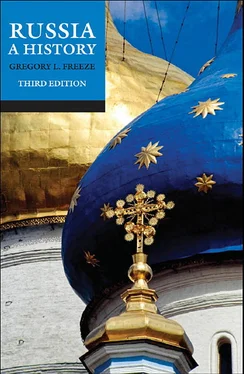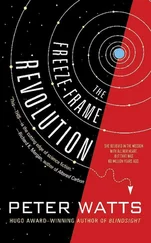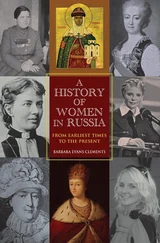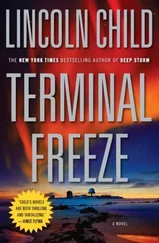Gary Markeris professor of history at the State University of New York at Stony Brook. He is the author of Publishing, Printing, and the Origins of Intellectual Life in Russia, 1700–1800 (1985) and Imperial Saint: The Cult of St. Catherine and the Dawn of Female Rule in Russia (2007). He has co-edited Reinterpreting Russian History (1994) and edited two other volumes, Ideas, Ideologies, and Intellectuals in Russian History (1993) and Catherine the Great and the Search for a Usable Past (1994).
Janet Martinis professor of history at the University of Miami, Coral Gables, Florida. She is the author of Treasure of the Land of Darkness: The Fur Trade and its Significance for Medieval Russia (1986) and Medieval Russia, 980–1584 (1995).
Daniel T. Orlovskyis professor of history at Southern Methodist University, Dallas, Texas. He is the author of The Limits of Reform: The Ministry of Internal Affairs in Imperial Russia, 1802–1881 and edited Beyond Soviet Studies (1995). He is currently compiling a documentary history of the Provisional Government of 1917, Russia’s Democratic Revolution, for the Yale series ‘Annals of Communism’.
David L. Ranselis the Robert F. Byrnes Professor of History and director of the Russian and East European Institute at Indiana University. He is the author of The Politics of Catherinian Russia: The Panin Party (1975), Mothers of Misery: Child Abandonment in Russia (1988), Village Mothers: Three Generations of Change in Russia and Tataria (2000), and A Russian Merchant’s Tale: The Life and Adventures of Ivan Alekseevich Tolchenov (2009). He co-edited a seminal collection of essays, Imperial Russia: New Histories for the Empire (1998) as well as Polish Encounters, Russian Identity (2005).
Lewis Siegelbaumis professor of history at Michigan State University. He has written extensively on Russian and Soviet labour history. Among his books are Stakhanovism and the Politics of Productivity in the USSR, 1935–1941 (1988); Soviet State and Society between Revolutions, 1918–1929 (1992), Workers of the Donbass Speak: Survival and Identity in the New Ukraine, 1989–1992 (co-authored, 1995), Stalinism as a Way of Life: A Narrative in Documents (2000), and Cars for Comrades: The Life of the Soviet Automobile (2008).
Hans-Joachim Torkewas professor of Russian and East European history at the Free University of Berlin. His publications include Das russische Beamtentum in der ersten Hälfe des 19. Jahrhunderts (1967) and Das staatsbedingte Gesellschaft im Moskaner Reich (1974).
Reginald E. Zelnikwas professor of history at the University of California at Berkeley. He was the author of Labor and Society in Tsarist Russia (1971), editor and translator of the memoirs of Semen Kanatchikov ( A Radical Worker in Tsarist Russia (1986)), and, more recently, published Law and Disorder on the Narova River: The Kreenholm Strike of 1872 (1995).
GLOSSARY OF TERMS, ABBREVIATIONS, AND ACRONYMS
Barshchina — Corvée labour (rendering of serf obligations through personal labour)
Batrak — Landless peasant (in Soviet jargon, a peasant who had no land and earned his support as a hired agricultural labourer)
Bedniak — Poor peasant (in Soviet jargon, a peasant whose farm income was insufficient and who had to hire himself out to kulaks)
Besprizorniki — Homeless, orphaned children in the 1920s
Boyar duma — Boyar council in medieval Russia
CC — Central Committee
Centner — Hundredweight, or 100 kg. (from the German Zentner)
Cheka — Extraordinary Commission (created in December 1917 to ‘combat counter-revolution and sabotage’)
Chernozem — Black-earth region of southern Russia
Chetvert′ — Unit of dry measure for grain, equivalent to 288 pounds of rye in the seventeenth century
CIS — Commonwealth of Independent States (established in December 1991 as an association of most of the former Soviet republics)
Cominform — Communist Information Bureau (established in 1947 to coordinate Communist Parties in the Western and Eastern blocs)
CPD — Congress of People’s Deputies (last Soviet parliament elected in 1989)
CPRF — Communist Party of the Russian Federation (the reconstituted CPSU in the post-Soviet era)
CPSU — Communist Party of the Soviet Union
Dikoe pole — The untamed southern steppes (literally meaning ‘wild field’)
Duma — State parliament of tsarist Russia, 1906–17, and post-Soviet Russia; elected city councils after the urban reform of 1870
GDP — Gross domestic product
GKO — State Defence Committee (chief military organ during the Second World War)
Glasnost — Openness or publicity (a reference to the relaxation of censorship controls in the 1850s and again in the late 1980s)
Gosudarstvenniki — Civil servants who were devoted primarily to serving the interests of the state (gosudarstvo), not their own social estate
GULAG — Main Administration of Camps (responsible for management of the labour camps)
iasak — Tribute exacted from non-Russian subject populations in Eastern Russia and Siberia
Kadets — Pre-revolutionary liberal party (name being an acronym of ‘Constitutional-Democrats’)
KGB — Committee for State Security (secret police)
Kolkhoz (pl. kolkhozy) — Collective farm (literally, ‘collective enterprise’, where the peasants nominally own the land, fulfil state grain procurements, and receive compensation as ‘workdays’ that they have contributed)
Komsomol — Communist Youth League
Kulak — Rich peasant (derived from the word for ‘fist’ after 1917 formally used to designate any peasant who ‘exploited’ the labour of others)
Lishentsy — Disenfranched (those members of the former ‘exploiting classes’, such as nobles, bourgeoisie, and clergy, who were deprived of civil rights and subjected to various other forms of discrimination from 1918 to 1936)
Manufaktura — Primitive handicrafts and industrial enterprises in early modern Russia
MTS — Machine Tractor Stations (state units established in 1935 to provide tractor and technical services to the kolkhoz )
Narkomindel — People’s Commissariat of Foreign Affairs
Narkompros — People’s Commissariat of Education
NEP — New Economic Policy
Nepman — Traders and entrepreneurs who engaged in ‘free enterprise’ during NEP
NKVD — People’s Commissariat of Internal Affairs
Nomenklatura — System of appointment lists, emerging in the first years of Soviet power and eventually coming to define the country’s political élite
Oblast — (pl. oblasti ) Soviet territorial unit, roughly equivalent to a pre-revolutionary province
Obrok — Quitrent (payment of serf obligations in kind or money)
Oprichnina — The separate state ‘within a state’ established by Ivan the Terrible in 1565; more generally used to designate this reign of terror, which lasted until 1572
Orgburo — Organizational Bureau
Perestroika — Reconstruction (the term adopted to designate a fundamental reform in the Soviet system from the mid-1980s)
Pomest′e — Conditional service estate in Muscovy, but by the eighteenth century equivalent to hereditary family property
Posad — Urban settlement in Muscovy
Читать дальше












